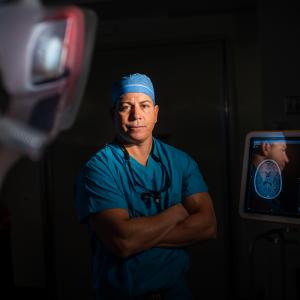In the midst of a joyous time, expectant parents can become overwhelmed by the wealth of tests that are available to assess the health of their unborn child.
Recently, NYU Winthrop Hospital became the first hospital on Long Island to offer women with high-risk pregnancies a minimally invasive blood test to screen for the likelihood of fetal abnormalities such as Down syndrome. This new blood test’s accuracy is so high that it may drastically reduce the need for more invasive screening procedures such as chorionic villus sampling (CVS) or amniocentesis.
“Until recently, the only methods for screening fetuses of high-risk pregnant women for Down syndrome were through the use of maternal analyte tests—a test that examines the mother’s blood for substances made by the baby and the placenta—and ultrasounds, which have approximately 15 percent false positive rates. Confirmatory diagnostic tests like CVS and genetic amniocentesis are more risky and invasive procedures,” said Anthony M. Vintzileos, MD, chairman of the Department of Obstetrics and Gynecology at NYU Winthrop. “This new blood test can screen patients for fetal Down syndrome with virtually no risk and extremely high accuracy.”
The MaterniT21 plus test, and other blood tests like it, looks at fragments of free DNA from the baby that are present in the mother’s blood. The presence of extra DNA in the mother’s blood indicates Down syndrome. The test is over 99 percent accurate and is available to pregnant women who are over the age of 35, have a personal or family history of Down syndrome, as well as to those who experience abnormal ultrasound or maternal serum screening results. The blood test can be administered anytime from the 10th week of pregnancy onward.
“In many instances, patients can avoid having more invasive amniocenteses due to the blood tests’ extremely low false positive rate,” said Martin Chavez, MD, chief of NYU Winthrop’s Division of Maternal–Fetal Medicine and director of the Fetal Surgery Program.
Recently, 38-year-old Merrick resident Leticia Schmidt, a patient of NYU Winthrop obstetrician Gary M. Levine, MD, opted to have the MaterniT21 blood test under Dr. Chavez’s supervision. Schmidt, who is pregnant with her third child, had an amniocentesis during her second pregnancy and the experience left her wary about undergoing another one.
“As a mother, it was very scary to see a needle inside of my uterus and almost touching my baby,” recalls Schmidt.
So, when Schmidt and her husband, Eduardo, learned that a simple new blood test could provide highly accurate screening for fetal abnormalities, the couple was eager to explore the option. Schmidt was the first patient at NYU Winthrop to have the test, which became available in April.
“It was so easy to do and was very comforting for us,” said Schmidt.

